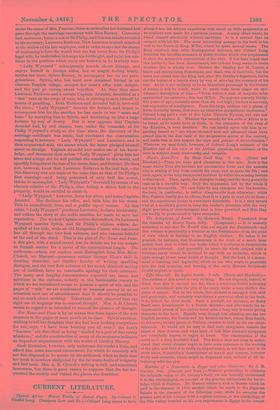CURRENT LITERATURE.
Central Africa: Naked Truths of Naked People. By Colonel C. Maki Long. (Sampson Low and Co.)—Colonel Long seems to have
plunged into his African expedition with about as little preparation as an explorer ever made for a perilous journey. Among other wants, he found himself absolutely without medicine. It is a marvel that he escaped with his life. The most interesting passage in his book is his visit to the Court of King M'Tsd, where he spent several weeks. The King received him with distinguished honours, and Colonel Long describes the horrible massacre of thirty victims which was perpetrated to show the monarch's appreciation of the visit. It has been hoped that this barbarity has been discontinued, but Colonel Long seems to doubt whether this is wholly true. Neither Mr. Stanley nor M. Linant, a brave and enterprising Frenchman now dead, was so received ; bat the latter has stated that the King had, after Mr. Stanley's departure, blown out the brains of a female slave by way of showing the accuracy of his aim. As he is not unlikely to be an important personage in the history of Africa, it will be worth while to quote from these pages an eye- witness's description of him :—" From within a man of majestic mien approached the entrance ; this was M'TerS. He appears scarcely thirty- five years of age ; certainly more than six feet high ; his face is nervous, but expressive of intelligence. From his large, restless oyo a gleam of fierce brutality beams, that mars an otherwise sympathetic expression." Colonel Long paid a visit to the Lake Victoria Nyanza, but was not allowed to explore it. Whether the remedy for the evils of Africa is to be found, as he would have us think, in the extension of the sway of the Khedive, is very doubtful. We can hardly agree with him in re- garding Ismail as" one whose elevated soul and advanced ideas have placed him in the first rank of the progressive spirits of the century, and made him in this respect the type and pioneer of its civilisation." Whatever we may think, however, of Colonel Long's estimate of the Khedive and of his view of the African question, his evidence on the facts is without doubt trustworthy and valuable.


































 Previous page
Previous page